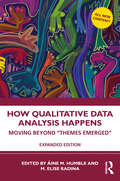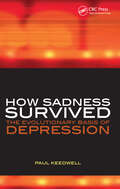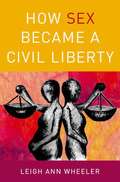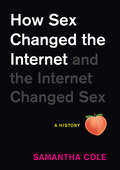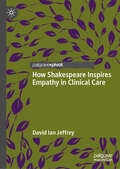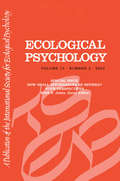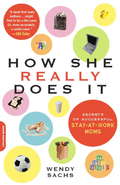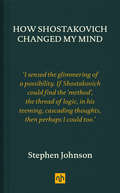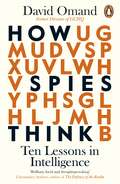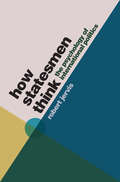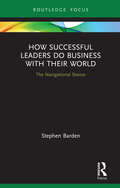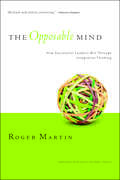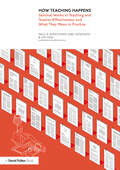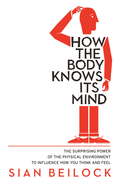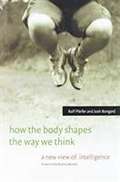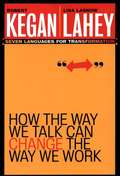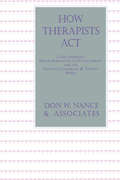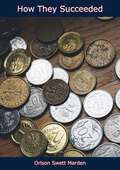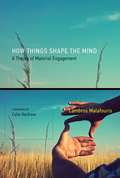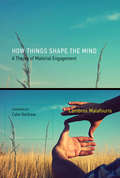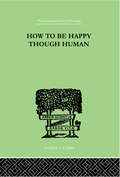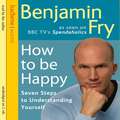- Table View
- List View
How Qualitative Data Analysis Happens: Moving Beyond “Themes Emerged”
by Áine M. Humble M. Elise RadinaHow Qualitative Data Analysis Happens: Moving Beyond “Themes Emerged”, offers an in-depth look into how qualitative social science researchers studying a wide range of human experiences and dynamics approach their data analyses. This expanded edition consists of 13 new chapters from a broad range of disciplines (and an added conclusion) that document the stories about how qualitative data analysis occurred.Chapters for this expanded edition represent a diversity of disciplines (e.g., criminology, family science, education, health, nutrition, sociology, sport psychology) that focus on the human experience and describe a diversity of methodological approaches. These chapters may be used to introduce readers to newer or innovative ways of analysing data. It moves beyond the usual vague statement of “themes emerged from the data” to show readers how researchers actively and consciously arrive at their themes and conclusions, revealing the complexity and time involved in making sense of thousands of pages of interview data, multiple data sources, and diverse types of data. The various authors provide detailed narratives into how they analysed their data from previous publications. The methodologies range from arts-based research, autoethnography, community-based participatory research, ethnography, grounded theory, to narrative analysis. The volume allows readers to be seemingly “in the room” with these international scholars (representing Canada, the US, Austria, Germany, the UK, and the Philippines) and getting their own hands vicariously dirty with the data.This expanded edition also includes a conclusion chapter, in which the authors reflect on commonalities across the chapters. Supplemental figures, images, and screenshots, which are referred to in the chapters, are included in an accompanying eResource (that can be accessed at www.routledge.com/ 9781032183213), as well as links to the previously published work on which the chapters are based. This book is an invaluable resource for experienced and novice qualitative researchers throughout the social sciences, as well as undergraduate and postgraduate students in the field.
How Sadness Survived: The Evolutionary Basis of Depression
by Philip Barker Paul Keedwell"What I am offering is a critical overview of ideas about depression, some new, some old, which fall under the discipline of 'evolutionary psychology'(EP). Do most types of depression represent an adaptation - an evolved mechanism which has improved our survival and reproductive value in our ancestral environment? Has depression been selected? Coul
How Sex Became a Civil Liberty
by Leigh Ann WheelerHow Sex Became a Civil Liberty is the first book to show how and why we have come to see sexual expression, sexual practice, and sexual privacy as fundamental rights. Using rich archival sources and oral interviews, historian Leigh Ann Wheeler shows how the private lives of women and men inthe American Civil Liberties Union shaped their understanding of sexual rights as they built the constitutional foundation for the twentieth-century's sexual revolutions. Wheeler introduces readers to a number of fascinating figures, including ACLU founders Crystal Eastman and Roger Baldwin; nudists, victims of involuntary sterilization, and others who appealed to the organization for help; as well as attorneys like Dorothy Kenyon, Harriet Pilpel, and Melvin Wulf,who pushed the ACLU to tackle such controversial issues as abortion and homosexuality. It demonstrates how their work with the American Birth Control League, Planned Parenthood Federation, Kinsey Institute, Playboy magazine, and other organizations influenced the ACLU's agenda. Wheeler explores the ACLU's prominent role in nearly every major court decision related to sexuality while examining how the ACLU also promoted its agenda through grassroots activism, political action, and public education. She shows how the ACLU helped to collapse distinctions between public andprivate in ways that privileged access to sexual expression over protection from it. Thanks largely to the organization's work, abortion and birth control are legal, coerced sterilization is rare, sexually explicit material is readily available, and gay rights are becoming a reality. But this bookdoes not simply applaud the creation of a sex-saturated culture and the arming of citizens with sexual rights; it shows how hard-won rights for some often impinged upon freedoms held dear by others.
How Sex Changed the Internet and the Internet Changed Sex: An Unexpected History
by Samantha ColeFrom the moment there was an &“online,&” there was sex online. The famous test image used by software engineers to develop formats like the jpeg was &“Lena,&” taken from Playboy&’s November 1972 centerfold. Early bulletin boards and multi-user domains quickly came to serve their members sexual musings. Facebook started as a way to rate &“hot or not&” Harvard co-eds. In fact, virtually every significant development that defines the Internet we know and love (and hate) today—privacy issues, online payments and online banking, dating, social media, streaming technology, mass data collection—came out the meeting of sexuality and technology. Not only did sexuality vastly influence the internet, but the internet arguably changed modern sexuality by giving every imaginable non-hetereonormative community a safe place to explore, fantasize, thrive, and be accepted. Which of course only led to more exploring, more fantasizing, more thriving. A lively, highly visual history, filled with broad themes and backstories, pioneering personalities and eureka-moments, How Sex Changed the Internet and the Internet Changed Sex covers everything from Jennicam (remember her?) to deep fakes. And most of what came in between, including &“A Brief History of Online Dating&” and the promise that VR spaces like the metaverse hold for the future of human sexual interactions. Porn is just one part of the story. Rather, this is a story about human nature during the digital gold rush of the last fifty years.
How Sex Changed: A History of Transsexuality in the United States
by Joanne MeyerowitzHow Sex Changed is a fascinating social, cultural, and medical history of transsexuality in the United States. Joanne Meyerowitz tells a powerful human story about people who had a deep and unshakable desire to transform their bodily sex. In the last century when many challenged the social categories and hierarchies of race, class, and gender, transsexuals questioned biological sex itself, the category that seemed most fundamental and fixed of all. From early twentieth-century sex experiments in Europe, to the saga of Christine Jorgensen, whose sex-change surgery made headlines in 1952, to today's growing transgender movement, Meyerowitz gives us the first serious history of transsexuality. She focuses on the stories of transsexual men and women themselves, as well as a large supporting cast of doctors, scientists, journalists, lawyers, judges, feminists, and gay liberationists, as they debated the big questions of medical ethics, nature versus nurture, self and society, and the scope of human rights. In this story of transsexuality, Meyerowitz shows how new definitions of sex circulated in popular culture, science, medicine, and the law, and she elucidates the tidal shifts in our social, moral, and medical beliefs over the twentieth century, away from sex as an evident biological certainty and toward an understanding of sex as something malleable and complex. How Sex Changed is an intimate history that illuminates the very changes that shape our understanding of sex, gender, and sexuality today.
How Sexual Desire Works
by Frederick ToatesThere are countless books on sex and an endless fascination with the subject. Varieties and vagaries of sexual desire have long been documented, but there has been little engagement with cutting-edge scientific research to uncover the biological and psychological bases of sexual desire. Here, Frederick Toates uses the insights of modern science to show how a wide range of desire-related phenomena - fantasy, novelty-seeking, sexual addiction, sex-drug interactions, fetishes, voyeurism, and sexual violence and killing - start to make sense. For example, the role of the brain's neurochemical dopamine can now be much better understood in terms of wanting, and a distinction between wanting and liking has been established. Also, an understanding of the layered organization of the brain, sometimes described as hierarchical, can be used to explain temptation and conflict. This is a fascinating book with great social relevance to society and its problems with sexuality.
How Shakespeare Inspires Empathy in Clinical Care
by David Ian JeffreyThis book investigates how a study of Shakespeare’s plays may enhance empathy in doctors, nurses, and other healthcare professionals. Addressing the widely perceived empathy gap in teaching and medical practice that emerged after the Covid-19 pandemic, the book presents a new study into the psychosocial elements of human interactions. It offers invaluable insights into how students and practitioners may be supported in dealing appropriately with their emotions as well as with those of their patients, thereby facilitating more humane medical care. Fostering an empathic patient-doctor relationship, the author explores the emotional, cognitive and moral dimensions of care and describes how Shakespeare studies can be realistically incorporated into the medical curriculum through group reflections, workshops and special study modules.
How Shall Affordances Be Refined?: Four Perspectives:a Special Issue of ecological Psychology
by Keith S. JonesWhat should and should not be considered an affordance is still an open issue. This special issue expands on the 2002 North American meeting of the International Society for Ecological Psychology covering this topic. The first article argues that affordances are properties of the animal-environment system and are emergent properties that do not inhere in either the environment or the animal. The next paper focuses on four issues regarding affordances: the ontological status, whether or not they are necessarily related to (one's own) actions, the relation between affordances and effectivities, and the nesting of affordances. Finally, several exemplars of phenomenologically driven perceptual research are examined, as well as the advantages over extant theories of affordances.
How She Really Does It: Secrets of Successful Stay-at-Work Moms
by Wendy SachsThe kids are sick but the boss needs the presentation on her desk by ten. The parent-child kindergarten brunch can’t be missed, yet the business meeting beckons. When the only thing she knows for sure is that her day will bring a new set of challenges and priorities to be juggled, how does a stay-at-work mom do it all?Wendy Sachs, stay-at-work mother of two, has interviewed women from every walk of life- from celebrities like makeup maven Bobbi Brown, designer Vera Wang, CNN’s Soledad O’Brien, the Today Show’s Ann Curry to everyday moms from all over the country-and has uncovered some inspiring answers. For starters, some stay-at-work moms have given up striving for balance; for true happiness and sanity, integration is the real key. Others have discovered that compartmentalization-wearing different hats at different times of day-is the only way to thrive. For all, the psychological, emotional, and financial payback of work is what keeps them feeling alive; even if they could afford not to work (and many can afford the choice), they wouldn’t have it any other way. Demonstrating that a byproduct of having career ambition is a happier marriage and family, How She Really Does It will validate the millions of women now attempting to "have it all,” or at least some of it all the time. Revealing the keys to staying-at-work, staying sane, staying satisfied, and staying at the heart of her family as well, How She Really Does It is a modern working woman’s handbook.
How Shostakovich Changed My Mind
by Stephen JohnsonA powerful look at the extraordinary healing effect of music on sufferers of mental illness, including author Stephen Johnson's struggle with bipolar disorder.BBC music broadcaster Stephen Johnson explores the power of Shostakovich’s music during Stalin’s reign of terror, and writes of the extraordinary healing effect of music on sufferers of mental illness. Johnson looks at neurological, psychotherapeutic and philosophical findings, and reflects on his own experience, where he believes Shostakovich’s music helped him survive the trials and assaults of bipolar disorder.There is no escapism, no false consolation in Shostakovich’s greatest music: this is some of the darkest, saddest, at times bitterest music ever composed. So why do so many feel grateful to Shostakovich for having created it—not just Russians, but westerners like Stephen Johnson, brought up in a very different, far safer kind of society? The book includes interviews with the members of the orchestra who performed Shostakovich’s Leningrad Symphony during the siege of that city.
How Societies Remember
by Paul ConnertonIn treating memory as a cultural rather than an individual faculty, this book provides an account of how bodily practices are transmitted in, and as, traditions. Most studies of memory as a cultural faculty focus on written, or inscribed transmissions of memories. Paul Connerton, on the other hand, concentrates on bodily (or incorporated) practices, and so questions the currently dominant idea that literary texts may be taken as a metaphor for social practices generally. The author argues that images of the past and recollected knowledge of the past are conveyed and sustained by ritual performances and that performative memory is bodily. Bodily social memory is an essential aspect of social memory, but it is an aspect which has until now been badly neglected. An innovative study, this work should be of interest to researchers into social, political and anthropological thought as well as to graduate and undergraduate students.
How Spies Think: Ten Lessons in Intelligence
by David OmandFrom the former director of GCHQ, learn the methodology used by British intelligence agencies to reach judgements, establish the right level of confidence and act decisively.Full of revealing examples from a storied career, including key briefings with Prime Ministers and strategies used in conflicts from the Cold War to the present, in How Spies Think Professor Sir David Omand arms us with the tools to sort fact from fiction.And shows us how to use real intelligence every day.*****'One of the best books ever written about intelligence analysis and its long-term lessons' Christopher Andrew, The Defence of the Realm: The Authorized History of MI5'An invaluable guide to avoiding self-deception and fake news' Melanie Phillips, The TimesWINNER OF THE NEAVE BOOK PRIZE 2022LONGLISTED FOR THE ORWELL PRIZE FOR POLITICAL WRITING 2021
How Statesmen Think: The Psychology of International Politics
by Robert JervisRobert Jervis has been a pioneering leader in the study of the psychology of international politics for more than four decades. How Statesmen Think presents his most important ideas on the subject from across his career. This collection of revised and updated essays applies, elaborates, and modifies his pathbreaking work. The result is an indispensable book for students and scholars of international relations.How Statesmen Think demonstrates that expectations and political and psychological needs are the major drivers of perceptions in international politics, as well as in other arenas. Drawing on the increasing attention psychology is paying to emotions, the book discusses how emotional needs help structure beliefs. It also shows how decision-makers use multiple shortcuts to seek and process information when making foreign policy and national security judgments. For example, the desire to conserve cognitive resources can cause decision-makers to look at misleading indicators of military strength, and psychological pressures can lead them to run particularly high risks. The book also looks at how deterrent threats and counterpart promises often fail because they are misperceived.How Statesmen Think examines how these processes play out in many situations that arise in foreign and security policy, including the threat of inadvertent war, the development of domino beliefs, the formation and role of national identities, and conflicts between intelligence organizations and policymakers.
How Successful Leaders Do Business with Their World: The Navigational Stance (Emerging Conversations in Leadership)
by Stephen BardenIn this rigorously researched book Stephen Barden presents compelling evidence that top leaders learn from a very early age to 'do business with the world' by using their power and authority to partner with it, rather than impose themselves on it. Based on interviews with military, corporate and educational leaders, How Successful Leaders Do Business with Their World offers powerful insight into how these findings can be applied in practice. The book illustrates how the assumptions leaders formed as children, and the way they learned to 'make space for themselves', directly links to the way they exercise their leadership as adults. Barden uses these findings and insights, as well as studies from his own corporate leadership career and coaching practice, to describe a set of common assumptions held by successful leaders. The book clearly outlines several key concepts - the Navigational Stance, the Partnering Stance, the Oppositional Stance and the Navigational Compass - illustrates each with relevant examples and makes recommendations for applying these insights in practice. How Successful Leaders Do Business with Their World will be a valuable asset for coaches, leaders, HR and L&D professionals, and all professionals working with leaders.
How Teaching Happens: Seminal Works in Teaching and Teacher Effectiveness and What They Mean in Practice
by Carl Hendrick Paul A. Kirschner Jim HealBuilding on their bestselling book How Learning Happens, Paul A. Kirschner and Carl Hendrick are joined by Jim Heal to explore how teaching happens. The book seeks to closely examine what makes for effective teaching in the classroom and how research on expert teaching can be used in practice. Introducing 30 seminal works from the field of education psychology research, the learning sciences, and teaching effectiveness studies, each chapter takes an important work and illustrates clearly and concisely what the research means and how it can be used in daily practice. Divided into six sections the book covers: • Teacher Effectiveness, Development, and Growth • Curriculum Development / Instructional Design • Teaching Techniques • Pedagogical Content Knowledge • In the Classroom • Assessment The book ends with a final chapter on "What’s Missing?" in how teachers learn to teach. Written by three leading experts in the field with illustrations by Oliver Cavigioli, How Teaching Happens provides a clear roadmap for classroom teachers, school leaders, and teacher trainers/trainees on what effective teaching looks like in practice.
How The Body Knows Its Mind: The Surprising Power Of The Physical Environment To Influence How You Think And Feel
by Sian BeilockIf you've ever gestured wildly with your hands in order to coax a word from your memory, or if you've sat up straighter in a meeting to feel more confident and alert, then you already know some of the ways the body can make an impact on the mind. But what if that's just the tip of the iceberg? Recent research shows that the extent to which the body affects the brain is greater than we'd ever imagined. Now How the Body Knows Its Mind reveals extraordinary ways you can use your body to improve your mind and performance in all areas of life.We often think of the brain as the master control centre - interpreting experiences, deciding what to do, and pulling the levers of the body. Sian Beilock, a leading expert on the brain science behind human performance and professor in the psychology department at the University of Chicago, turns our understanding of the mind upside down in How the Body Knows Its Mind.Your brain doesn't make that much of a distinction between what happens in your body and what happens in your mind. In fact, our bodies actually hack our brains. The way we move affects our thoughts, our decisions, and our preferences, and kids absorb more when they use their bodies as a learning tool. Called "embodied cognition," this new science illuminates the power of the body and its physical surroundings to shape how we think, feel, and behave: pacing around the room can enhance creativity; walking in nature boosts concentration skills; Botox users experience less depression; fit children score higher on tests in school.From the tricks used by advertisers to the ways body language can improve your memory to how to master public speaking, Beilock explains a wealth of fascinating interconnections between mind and body and shows how mastering them can make you happier, safer, and more successful.
How The Body Shapes The Way We Think: A New View Of Intelligence
by Rolf Pfeifer Josh BongardHow could the body influence our thinking when it seems obvious that the brain controls the body? In How the Body Shapes the Way We Think, Rolf Pfeifer and Josh Bongard demonstrate that thought is not independent of the body but is tightly constrained, and at the same time enabled, by it. They argue that the kinds of thoughts we are capable of have their foundation in our embodiment--in our morphology and the material properties of our bodies. <P><P> This crucial notion of embodiment underlies fundamental changes in the field of artificial intelligence over the past two decades, and Pfeifer and Bongard use the basic methodology of artificial intelligence--"understanding by building"--to describe their insights. If we understand how to design and build intelligent systems, they reason, we will better understand intelligence in general. In accessible, nontechnical language, and using many examples, they introduce the basic concepts by building on recent developments in robotics, biology, neuroscience, and psychology to outline a possible theory of intelligence. They illustrate applications of such a theory in ubiquitous computing, business and management, and the psychology of human memory. Embodied intelligence, as described by Pfeifer and Bongard, has important implications for our understanding of both natural and artificial intelligence.
How The Way We Talk Can Change The Way We Work: Seven Languages for Transformation
by Lisa Laskow Lahey Robert KeganWhy is the gap so great between our hopes, our intentions, even our decisions-and what we are actually able to bring about? Even when we are able to make important changes-in our own lives or the groups we lead at work-why are the changes are so frequently short-lived and we are soon back to business as usual? What can we do to transform this troubling reality? In this intensely practical book, Harvard psychologists Robert Kegan and Lisa Laskow Lahey take us on a carefully guided journey designed to help us answer these very questions. And not just generally, or in the abstract. They help each of us arrive at our own particular answers that can solve the puzzling gap between what we intend and what we are able to accomplish. How the Way We Talk Can Change the Way We Work provides you with the tools to create a powerful new build-it-yourself mental technology.
How Therapists Act: Combining Major Approaches To Psychotherapy And The Adaptive Counselling And Therapy Model
by Don W. NanceIn this edited casebook, therapists identified with major theoretical approaches demonstrate how they use the Adaptive Counselling and Therapy ACT Model in combination with their preferred theoretical perspective. Differences in each therapist's tone and approach are captured in six case chapters. Weaving the integrative thread of ACT throughout the tapestry of cases, this text combines illustrative material from specific theoretical approaches.; A major focus of the volume involves combining ACT with Cognitive Behaviour Therapy, Humanistic Psychotherapy, Systems Theory, Time-Limited Psychodynamic Counselling and Eclectic Counselling for women and men.; Serving as a text for graduate-level methods and theory courses in counselling, psychology, mental health counselling and counselling guidance, this book can also be used as a resource for practitioners in the same areas. It emphasises tasks, readiness, and adapting therapist behaviour and treatments to each client.
How They Succeeded: Life Stories Of Successful Men Told By Themselves (classic Reprint)
by Orison Swett MardenDiscover the timeless secrets of success with Orison Swett Marden’s inspirational classic, "How They Succeeded." This compelling book offers a deep dive into the lives and strategies of some of the most successful individuals of the late 19th and early 20th centuries, providing valuable insights and practical lessons that are as relevant today as they were then.Orison Swett Marden, a pioneering thinker in the field of personal development and self-help, meticulously gathers and presents the stories of remarkable men and women who achieved extraordinary success in their respective fields. Through in-depth interviews and biographical sketches, Marden reveals the principles, habits, and mindsets that propelled these individuals to the pinnacle of their careers."How They Succeeded" features a diverse array of success stories, including entrepreneurs, inventors, writers, and public figures. Marden delves into the lives of icons such as Andrew Carnegie, Thomas Edison, Marshall Field, and many others, uncovering the common threads that connect their journeys to success. Readers will learn about the importance of perseverance, innovation, hard work, and a positive attitude, as well as the role of vision and determination in overcoming obstacles.Marden’s engaging writing style and keen insights make "How They Succeeded" both an informative and motivational read. Each chapter is rich with practical advice and inspirational anecdotes that encourage readers to apply these timeless principles to their own lives. Whether you are an aspiring entrepreneur, a professional looking to advance your career, or someone seeking personal growth, this book offers invaluable guidance and inspiration."How They Succeeded" is not just a collection of success stories; it is a roadmap for achieving excellence and fulfillment in any endeavor. Orison Swett Marden’s work continues to inspire generations of readers to strive for greatness and to believe in the power of their dreams.Join Orison Swett Marden on a journey through the paths of those who have achieved remarkable success, and discover the enduring principles that can help you achieve your own aspirations. "How They Succeeded" is a timeless guide to unlocking your potential and reaching new heights of accomplishment.
How Things Shape the Mind
by Colin Renfrew Lambros MalafourisAn increasingly influential school of thought in cognitive science views the mind as embodied, extended, and distributed, rather than brain-bound, "all in the head." This shift in perspective raises important questions about the relationship between cognition and material culture, posing major challenges for philosophy, cognitive science, archaeology, and anthropology. In How Things Shape the Mind, Lambros Malafouris proposes a cross-disciplinary analytical framework for investigating the different ways in which things have become cognitive extensions of the human body. Using a variety of examples and case studies, he considers how those ways might have changed from earliest prehistory to the present. Malafouris's Material Engagement Theory adds materiality -- the world of things, artifacts, and material signs -- into the cognitive equation definitively. His account not only questions conventional intuitions about the boundaries and location of the human mind but also suggests that we rethink classical archaeological assumptions about human cognitive evolution. Arguing that the understanding of human cognition is essentially interlocked with the study of the technical mediations that constitute the central nodes of a materially extended and distributed human mind, Malafouris offers a series of archaeological and anthropological case studies -- from Stone Age tools to the modern potter's wheel -- to test his theory. How do things shape the mind? Considering the implications of the seemingly uniquely human predisposition to reconfigure our bodies and our senses by using tools and material culture, Malafouris adds a fresh perspective on a foundational issue in the study of human cognition.
How Things Shape the Mind: A Theory of Material Engagement
by Lambros MalafourisAn account of the different ways in which things have become cognitive extensions of the human body, from prehistory to the present.An increasingly influential school of thought in cognitive science views the mind as embodied, extended, and distributed rather than brain-bound or “all in the head.” This shift in perspective raises important questions about the relationship between cognition and material culture, posing major challenges for philosophy, cognitive science, archaeology, and anthropology. In How Things Shape the Mind, Lambros Malafouris proposes a cross-disciplinary analytical framework for investigating the ways in which things have become cognitive extensions of the human body. Using a variety of examples and case studies, he considers how those ways might have changed from earliest prehistory to the present. Malafouris's Material Engagement Theory definitively adds materiality—the world of things, artifacts, and material signs—into the cognitive equation. His account not only questions conventional intuitions about the boundaries and location of the human mind but also suggests that we rethink classical archaeological assumptions about human cognitive evolution.
How To Be Happy Though Human (Routledge Research International Library of Psychology)
by Wolfe, W BeranFirst published in 1999. Routledge is an imprint of Taylor & Francis, an informa company.
How To Be Happy: Seven Steps to Understanding Yourself
by Benjamin FryDoes your life seem to have all the right ingredients yet you find your goals are still out of reach?Do you find yourself involved in the same emotional situations again and again?In How to be Happy, Benjamin Fry guides you through his seven-step programme which will help you to improve your life: by learning to understand yourself, you can achieve the happiness you deserve.Based on an exclusive live seminar presented here for the first time as an audiobook, Benjamin interlaces his techniques with his own stories and experiences that show how he has developed his methods. Demonstrating how his theories work in practice, Benjamin introduces you to the simple ideas that you too can use to achieve the happiness you have always hoped for.
